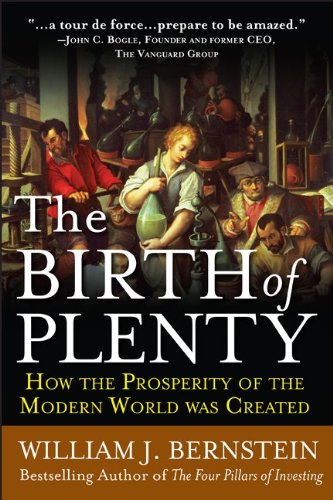Some of the best books I read are recommended by Fareed Zakaria on his Sunday morning show. The latest example is The Birth of Plenty by William Bernstein. Part history lesson, part economic lesson, and part political commentary, Bernstein explores the surge in economic activity since (roughly) the 1600’s. The goal of the book is to get to the core of why economic prosperity happens — what are the social, economic and political structures needed to pull people out of poverty and lift the financial well being of a nation and the world.
His findings are not revolutionary. It comes down to the same things we’ve known for a long time: property rights, the scientific mind, capital markets and communications. These four ingredients work together to create an atmosphere that fosters economic activity. Lose one ingredient, and the whole things collapses. Even though the book covers old ground, it does so in a way that is interesting and very readable. Perhaps best of all, it tells an old story in new ways that allows you to truly capture the important parts of the story.
If not groundbreaking, Bernstein’s thoughts in the book will sure to be thought provoking. For instance, he says the link between economic liberty and democracy is overblown. He also says that the culture of England and Holland, the two first truly prosperous modern nations that passed on their values to countless colonies around the world, stands in stark contrast to the Spanish model of conquest that still haunts Central and South America. Whether you agree or disagree, the ideas trigger a fun intellectual exercise.
I liked this book because it gave the kind of broad historic overview that we often ignore when looking at current events. I also liked this book because it was relatively positive about our economic future. Granted, he sees a decade or more of slow growth as we adjust to everything from more expensive commodities to the continued rise of public benefits. But Bernstein believes the power of the human spirit will overcome these challenges. He’s not irrationally optimistic, but he’s also not a doomsayer who thinks we’re headed to hell in a hand-basket (am I aging myself by using that expression?).
It’s well worth reading. Hope you enjoy it.

